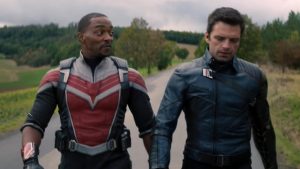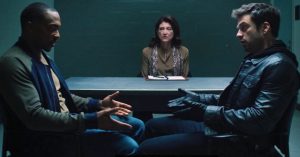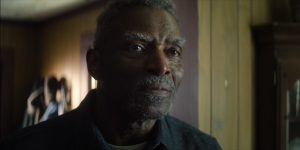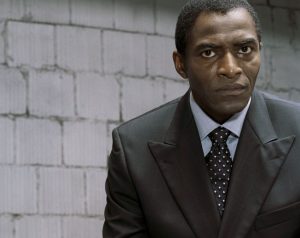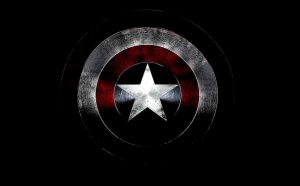SPOILERS FOR THE FALCON AND THE WINTER SOLDIER AHEAD!
Billed by the series’ producers as the single best episode of The Falcon And The Winter Soldier from a thematic standpoint, and highly-anticipated in the fandom due to its rumored inclusion of an epic Marvel Comics cameo, episode five – which bears the simple yet potent subtitle, “Truth” – delivers overwhelmingly on both fronts, diving into a timely discussion about Black identity in America while precisely utilizing the incomparable Julia Louis-Dreyfus to plant seeds for MCU storylines in the near future. After drifting slightly off-course in episode four, the series has regained its footing and the focus is back where it belongs, on Sam Wilson (Anthony Mackie)’s journey of reconciliation.

Louis-Dreyfus’ unexpected cameo as Marvel’s famous Contessa Valentina Allegra de Fontaine is a big deal for comic-book fans, probably deserving of its own breakdown, but The Falcon And The Winter Soldier very wisely doesn’t belabor the point, slipping the charismatic Contessa into just a single early scene before having her exit just as mysteriously as she arrived, leaving a blank business card and a promise to “keep in touch” in her wake. It hasn’t been confirmed if she’ll show up again in The Falcon And The Winter Soldier‘s upcoming finale, but there’s no question we’ll be seeing more of Louis-Dreyfus in the MCU soon, as her character’s sprawling comics history gives her plenty of potential story directions from which to choose.
But all the Easter eggs in the Marvel Multiverse (and there are thousands) can only go so far when it comes to crafting a truly meaningful story. Thankfully, that’s why The Falcon And The Winter Soldier is blessed to have a head writer like Malcolm Spellman, who uses the series’ penultimate episode to develop a profound commentary on the sacrifices Black people in America are expected to make every day for a country built by and for white supremacy…and how Sam Wilson’s fight to protect what he sees as the legacy of Captain America isn’t anywhere near as simple as it would be for a white man.
That’s something even Bucky Barnes (Sebastian Stan) comes to acknowledge later in the episode, apologizing to Sam for all the times he questioned his decision to give up Captain America’s shield, and specifically for never once considering how Sam’s identity as a Black man factored into that controversial decision. It’s a powerful moment that recognizes Sam’s Blackness as a crucial element of his character in-universe that can’t and shouldn’t be ignored or downplayed, even when that makes white characters and viewers uncomfortable; especially when that necessitates reevaluating Hollywood’s so-called “colorblind” strategy of treating characters as paper dolls, and racial and cultural identities as interchangeable outfits.
But that’s a moment. And in too many cases, The Falcon And The Winter Soldier‘s best scenes have been mere moments – due to occasionally poor pacing and the nearly consistent issue of time constraints. The latter is at least not a problem in today’s hour-long episode, which makes room for one extended dramatic sequence that I suspect will still be hailed as the series’ thematic high-point even after next week’s finale. In a story that revolves around Black identity, it’s no surprise that this incredible sequence is focused exclusively on two Black men – Sam Wilson and Isaiah Bradley (Carl Lumbly), who meet up at Isaiah’s house on the outskirts of Baltimore, with Sam initially intending to give the old man a chance to see Captain America’s shield.
And as Sam approaches the house, with the shield wrapped up in brown paper, it’s easy to envision how that hypothetical could have played out with a different screenwriter; all tears of joy and feel-good vibes. But Isaiah stops him in his tracks, recognizing the shield before Sam ever gets a chance to unwrap it. “Leave it covered,” he tells Sam bluntly. “Them stars and stripes don’t mean nothin’ good to me.”
At last, Isaiah finally gets a chance to tell his story. It’s not a comfortable one, particularly for anyone who recognizes the intentional parallels between his account and the history of the real-life Tuskegee Syphilis Study conducted on Black men between 1932 and 1972. Isaiah describes how he and the other men in his facility were told they were being treated for tetanus, though in reality their bodies were being used by the US Government as expendable vessels on which to test out experimental versions of the Super-Soldier Serum – all part of a race to recreate what Isaiah describes as the “great white hope” of Steve Rogers; the same race being run by John Walker (Wyatt Russell), a living still-frame of whiteness in action.
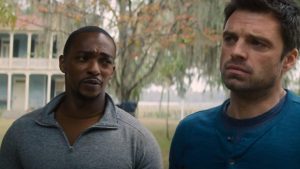
Lumbly’s performance throughout the sequence is so vividly and excruciatingly present, there’s no need for dramatized flashbacks even as Isaiah tells of his escape-attempt, and the thirty years he spent in prison on charges of treason while the experiments continued, and he was slowly drained of his superhuman blood, his resolve to live, and his sense of self. He was mutilated, erased from history, and, upon being released, forced into hiding. The fact that his blood now flows in John Walker’s veins backs up his pessimistic worldview: his entire life was reduced to the parts of him that could be mined to create more juiced-up white guys.
But it’s what Isaiah has to say about Sam that cuts most deeply: like an emotional gut-punch on par with, if not far exceeding, Vision’s profound analysis of grief in WandaVision. “They will never let a Black man be Captain America. And even if they did, no self-respecting Black man would ever wanna be.” It’s probably one of the most powerful lines ever spoken in the MCU, so quietly paradigm-altering that it demands a response from Sam – but since we don’t get to hear one because the scene ends there, we’ll have to see his response instead, through his actions. I don’t trust Disney to make the right call here, but it would be incredibly empowering to see Sam come out of this unaffiliated with the American government in any way.
To be honest, I don’t see another option that makes sense given how far Sam has progressed. He’s already shed his identity as the Falcon, symbolically passing his wings along to Joaquin Torres (Danny Ramirez); who, if the comics are to be trusted, will get plenty of use out of them. And while he could still use the Captain America moniker, he’s clearly sympathetic to the motives, though not the methods, of the anarchist Flag-Smashers – which probably wouldn’t make him too popular with any government, least of all the United States’.
The Flag-Smashers are an example of a subplot that has been meandering so long it feels pointless, only barely being kept afloat by Erin Kellyman’s performance as Karli Morgenthau. The group is apparently being secretly assisted by Sharon Carter (Emily VanCamp), who breaks Georges Batroc (Georges St-Pierre) out of jail and sends him along to New York City to help the Flag-Smashers orchestrate a hostage crisis that will shape next week’s finale – though the nighttime setting gives me concern that we won’t be able to fully appreciate the splendor of Sam Wilson’s new set of wings, which I believe to be the unspecified Wakandan-designed gift left behind at Sam’s house after Bucky stops by to help him fix up his family’s old fishing-trawler.
Separate from Sam, Bucky’s journey also starts strolling off on its own, leading him to the memorial in Sokovia namedropped two weeks ago by Baron Zemo (Daniel Brühl), whom Bucky finds there. In a slightly strange turn of events, Bucky aims a gun at Zemo’s head and pulls the trigger, only to then reveal that he removed the bullets…some emotionally manipulative payback for all of Zemo’s own manipulations. The Dora Milaje arrive to escort Zemo to The Raft, the high-security underwater prison seen in Civil War that is totally a great place to be holding one of the most dangerous criminals in the world.
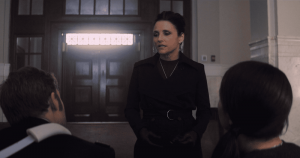
Obviously he won’t be there for long, but I have a feeling his time on The Falcon And The Winter Soldier may have come to an end. With a mid-credits scene revealing that John Walker is hard at work on his own handcrafted replica of Captain America’s shield (is anyone gonna tell him it needs vibranium to actually be effective, or…no? Okay), all our focus in next week’s finale will have to be on the action-packed showdown between Walker, Morgenthau, Barnes, Wilson…and Julia Louis-Dreyfus, which is a bizarre yet wonderful twist of fate that I can’t wait to watch spiral out across the MCU.
Episode Rating: 9/10
